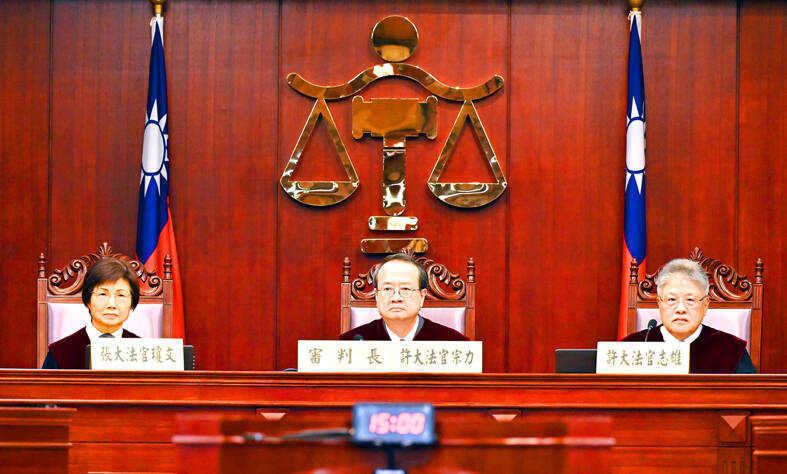The Constitutional Court is to hear oral arguments next month on the constitutionality of a package of controversial amendments passed by the legislature at the end of May that opposition lawmakers said would strengthen lawmakers’ ability to scrutinize the executive branch.
The oral arguments are scheduled to be held in Taipei on Aug. 6, the Judicial Yuan, which oversees the Constitutional Court, said in a news release on Thursday.
Relevant parties are to present their views on whether the amendments, which came into effect on Wednesday last week, contravene the Constitution and whether the deliberation that led up to their passage in the Legislative Yuan constituted “palpable” and “sufficient” defects.

Photo: Liao Chen-huei, Taipei Times
Respective cases were brought to the court over the past week by the Democratic Progressive Party (DPP) caucus, the Executive Yuan, President William Lai (賴清德) and the Control Yuan, as part of a DPP-led effort to overturn amendments they said are unconstitutional.
The changes to the Act Governing the Legislative Yuan’s Power (立法院職權行使法) and the Criminal Code were passed by Chinese Nationalist Party (KMT) and Taiwan People’s Party lawmakers, who hold a combined majority in the legislature, on May 28.
The updated laws grant the Legislative Yuan new investigative powers, including the power to hold hearings. Public officials would be fined or imprisoned if they refuse to attend hearings or provide information when asked to do so by legislators, or if they present false information.
People or entities in the private sector might also face penalties if they are deemed uncooperative.
The amendments also include provisions that could compel the president to give an annual state of the nation address and field questions from legislators.
Thursday’s announcement came two days after the Judicial Yuan said the Constitutional Court planned to hold a preparatory hearing for an injunction requested by the DPP petitioners seeking to halt enforcement of the new amendments.
Tens of thousands of protesters gathered outside the Legislative Yuan in the days leading up to the passing of the amendments on May 28, with an estimated 100,000 demonstrators on May 24.

‘DENIAL DEFENSE’: The US would increase its military presence with uncrewed ships, and submarines, while boosting defense in the Indo-Pacific, a Pete Hegseth memo said The US is reorienting its military strategy to focus primarily on deterring a potential Chinese invasion of Taiwan, a memo signed by US Secretary of Defense Pete Hegseth showed. The memo also called on Taiwan to increase its defense spending. The document, known as the “Interim National Defense Strategic Guidance,” was distributed this month and detailed the national defense plans of US President Donald Trump’s administration, an article in the Washington Post said on Saturday. It outlines how the US can prepare for a potential war with China and defend itself from threats in the “near abroad,” including Greenland and the Panama

A magnitude 4.9 earthquake struck off Tainan at 11:47am today, the Central Weather Administration (CWA) said. The hypocenter was 32.3km northeast of Tainan City Hall at a depth of 7.3km, CWA data showed. The intensity of the quake, which gauges the actual effect of a seismic event, measured 4 in Tainan and Chiayi County on Taiwan's seven-tier intensity scale, the data showed. The quake had an intensity of 3 in Chiayi City and County, and Yunlin County, while it was measured as 2 in Kaohsiung, Nantou County, Changhua County, Taitung County and offshore Penghu County, the data showed. There were no immediate reports of

The Chinese Nationalist Party (KMT) is maintaining close ties with Beijing, the Democratic Progressive Party (DPP) said yesterday, hours after a new round of Chinese military drills in the Taiwan Strait began. Political parties in a democracy have a responsibility to be loyal to the nation and defend its sovereignty, DPP spokesman Justin Wu (吳崢) told a news conference in Taipei. His comments came hours after Beijing announced via Chinese state media that the Chinese People’s Liberation Army’s Eastern Theater Command was holding large-scale drills simulating a multi-pronged attack on Taiwan. Contrary to the KMT’s claims that it is staunchly anti-communist, KMT Deputy

RESPONSE: The government would investigate incidents of Taiwanese entertainers in China promoting CCP propaganda online in contravention of the law, the source said Taiwanese entertainers living in China who are found to have contravened cross-strait regulations or collaborated with the Chinese Communist Party (CCP) could be subject to fines, a source said on Sunday. Several Taiwanese entertainers have posted on the social media platform Sina Weibo saying that Taiwan “must be returned” to China, and sharing news articles from Chinese state media. In response, the Mainland Affairs Council (MAC) has asked the Ministry of Culture to investigate whether the entertainers had contravened any laws, and asked for them to be questioned upon their return to Taiwan, an official familiar with the matter said. To curb repeated